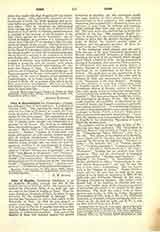

John of Rupella, Franciscan theologian, b. at La Rochelle (Rupella), towards the end of the twelfth century; d. 1245 (al., 1271). He seems to have entered the Franciscan Order at an early age, and was sent to the house of studies at Paris. There he was a disciple of Alexander of Hales, by whom he was presented for the bachelorship of theology. He was the first Franciscan to receive that degree at the University of Paris. In 1238 he was already a master of theology, with his own pupils, for his name is to be found in the list of masters convoked in that year by William, Bishop of Paris, to discuss the vexed question of ecclesiastical benefices. John was of the number of those who declared against the general lawfulness of plurality, and who afterwards taught the same doctrine in their schools. He appears henceforward to have enjoyed a very considerable reputation, and is described by Bernard of Besse as a professor of great fame for holiness and learning, whose writings were both solid and extremely useful. The same writer also declares him to be the best preacher of his day. This judgment should perhaps be tempered by the consideration of Bernard’s anxiety to prove that the greatest theologian (Alexander of Hales), the greatest warrior (John of Brienne), and the greatest preacher, all three belonged to his own Franciscan Order.
In the dissensions which already rent the order, John was one of the most determined opponents of Brother Elias, and with Alexander of Hales placed himself at the head of the movement which brought about Elias‘s downfall in 1239. At the command of Haymo of Faversham, who succeeded Elias as general, he collaborated with Alexander of Hales, Robert of Bastia, Richard of Cornwall, and several others less important, on an explanation of the Rule of St. Francis. The work received the approbation of the chapter (probably definitorial) of the order held at Bologna in 1242, and subsequently became known as the “Exposition of the Four Masters”. Wadding and the majority of succeeding writers place John of Rupella’s death in 1271, but a letter of Robert Grosseteste, Bishop of Lincoln, written in September or October, 1245, speaks of him as being then already dead: “mortuis fratribus Alexandro de Hales, et Joanne de Rupellis”. The date according to Denifle was February 3, but according to du Boulay October 27 The first date would preclude all possibility of attendance at the Council of Lyons; and Luguet’s assertion is probably thus without foundation. It is interesting, however, to note in this connection that a manuscript published in resume by Father Fidelis a Fanna (“Ratio Novae collectionis omnium operum S. Bonaventurae”, Turin, 1874, 98) contains a sermon preached by Master John de Rupella in the Dominican Monastery of Lyons, before the Roman Court.
No complete edition of the works of John of Rupella has ever been published. The “Exposition of the Four Masters” was printed at Venice in 1513, in the “Firmamentum Trium Ordinum”, pars 3a, p. 15b-19a. Two priests of the Diocese of La Rochelle, Canon Cholet and Fr. Grasilier, had already in 1875 prepared for the press the following: “Tractatus de anima”; “De Articulis fidei”, or “Summa Theologica”; “De decem praeceptis”; “Commentaria in Matthseum”; “Postillae in Epistolas Pauli”; “De vitiis”; “Sermones”. Nothing has yet resulted from their enterprise. They had also catalogued as belonging to the same author: “Postillae super Danielem”; “in Marcum”; “in Lucam”; “in Apocalypsim”. Du Boulay attributed to him a “Commentaria in quatuor Libros Sententiarum”, and says he was the first to write such a commentary. His best known work is the “Summa de Anima”. Father Fidelis a Fauna (op. cit., 82) says that no work on the same subject is to be found so frequently in MSS. of the thirteenth and fourteenth century in the many European libraries he searched. The author avails himself fully of the teaching of Aristotle and Avicenna, and touches upon all the important questions of psychology afterwards to be treated by the great Scholastics. The work was edited with an introduction and studies, in 1882, by Father Theophilus Domenichelli, O.F.M., from a MS. of the Biblioteca Nazionale at Florence, collated principally with two others (A, IV, 25, now no. 1288, and B, IV, 4, now no. 581) of the Casanatense, Rome.
BRENDAN JENNINGS

